The Samsung 950 Pro PCIe SSD Review (256GB and 512GB)
by Billy Tallis on October 22, 2015 10:55 AM ESTRandom Write Performance
The random write test is confined to a 16GB portion of the drive, which is otherwise empty. This allows the drive to demonstrate much higher performance than on our performance consistency test that fills the drive. Tasks like installing software updates can modify a lot of files, but aren't hitting the entire disk. Random writes to the entire disk are usually found only in enterprise workloads such as large databases.
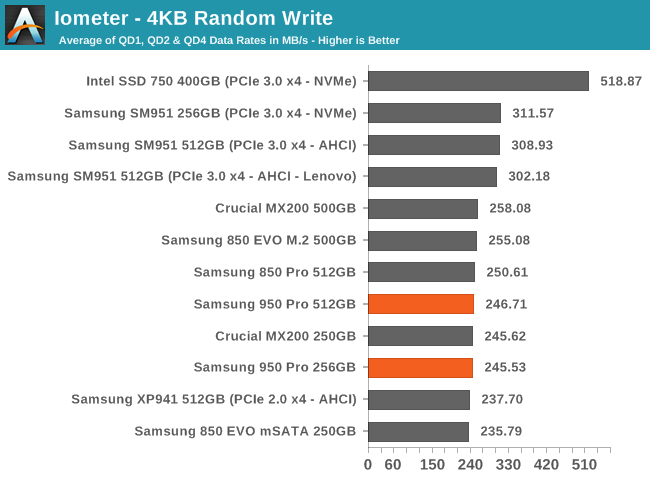
The 950 Pro's random write speeds aren't benefiting at all from the PCIe interface or the NVMe protocol, and are about 20% slower than the SM951. Since it's happening to both drives it probably isn't a thermal issue, so this may be the result of a firmware change. Still, the Intel SSD 750 is the only retail drive that significantly outperforms the tightly clustered competition.
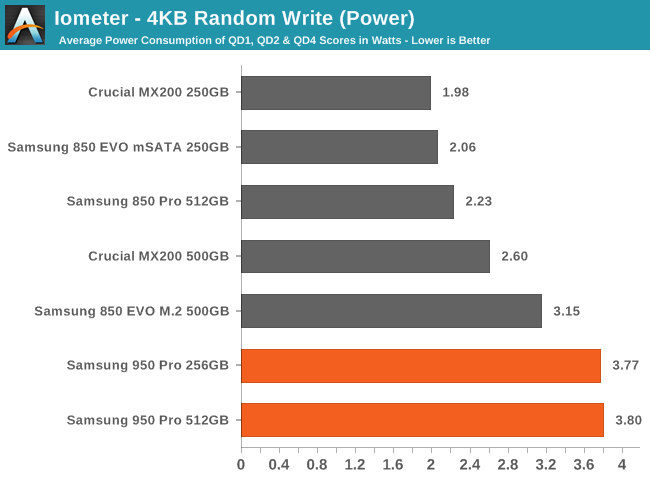
The higher power consumption during the random write test is a problem, since it's not buying any extra performance.
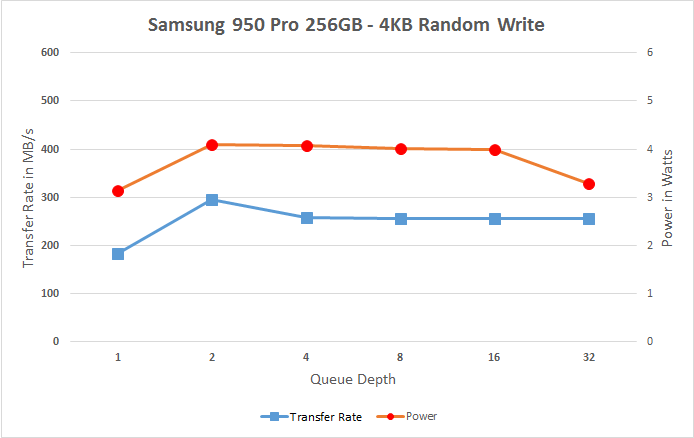 |
|||||||||
After increasing significantly from QD1 to QD2, performance and power drop slightly and stay flat for most of the rest of the test. At the very end, a slight drop in power for the 512GB and a more significant drop for the 256GB may indicate a change in what background processing is going on; the drive may be postponing some garbage collection during the onslaught of writes at the maximum queue depth, or it may be a coincidental case of the background processing catching up and throttling back near the end of the test.
Random Read Performance
Our random read performance test is conducted on a full drive and tests queue depths from 1 to 32. We focus primarily on the lower queue depths that are typical of interactive use, but also look at how the performance and power scales to more intensive loads. For desktop use, searching and virus scanning are typically the biggest sources of random reads, and they can exercise some of the larger queue depths.
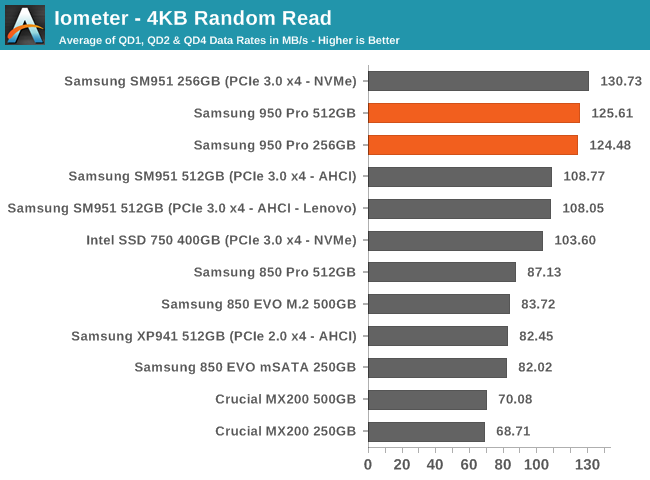
The strong random read performance of the 950 Pro provides great justification for its status as the a flagship drive for the consumer market.
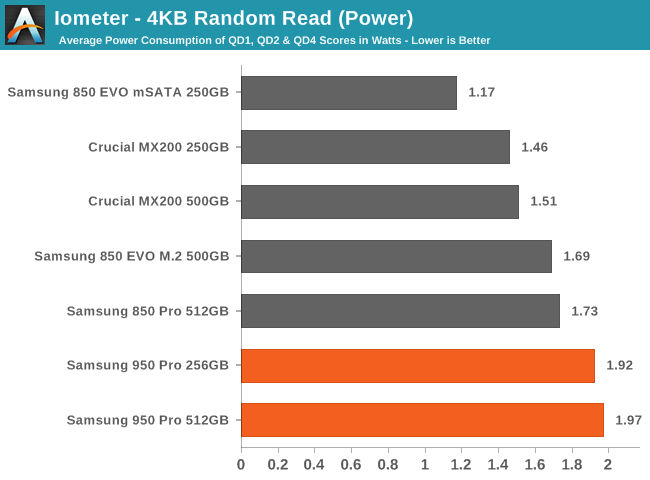
The 950 Pro's power consumption is moderately higher but nowhere close to being proprotional to the performance advantage; the 950 Pro doesn't have to run hot to offer great performance.
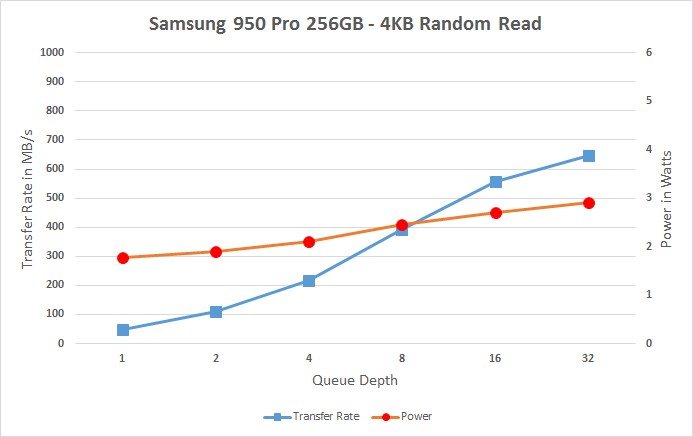 |
|||||||||
Power and performance scaling look very typical here, except I had to expand the performance axis for the 950 Pro. Both drives pass SATA's limits at or before QD16.










142 Comments
View All Comments
herbc - Friday, October 23, 2015 - link
How fast do you really need to be happy with using a computer is my question , my computer is faster now than i actually need it to be and all it has is a current SSD .Woff - Friday, October 23, 2015 - link
I have a system with Asus X99 DeLuxe motherboard and a I7-5960X cpu. I use a Samsung 850 EVO 500GB SSD connected to one of the SATA ports, but I want to upgrade this device to a M.2 Samsung 950 Pro. The motherboard offers two ways to connect a M.2 but I don't know witch is the best alternative. The X99 has a on-board M.2 (socket3) but is also delivered with a expansion card, a 'HYPER M.2 x4' card. Anyone who can help me with the best (fastest) solution to my problem?Redstorm - Friday, October 23, 2015 - link
You should be OK to use the Onboard M.2 slot as the manual says "32Gb transfer for the onboard M.2" page 'x' so 4 x PCIe 3.0cjelliott - Tuesday, November 17, 2015 - link
How did you get on with this 950 Pro SSD on the X99 Deluxe? Can you boot from it? I am tempted to buy this SSD but have seen a lot of forums where people are having trouble. I want to install and boot Win 10 Pro from it.l_d_allan - Saturday, October 24, 2015 - link
Hmmmm ... the Samsung Galaxy review was at the top for 5 days, then one day for an ASUS mother board, and only one day for the Surface 4, and now several days for the Samsung PCie SSD.Seems unbalanced. Or just "the luck of the draw"?
Kristian Vättö - Sunday, October 25, 2015 - link
Usually content is only released on weekdays, so reviews that go up later in the week (e.g. on Thursday) may get several days of page time. Oftentimes the content release is dictated by an embargo lift, so the time of publishing isn't on AnandTech's hands.I can assure you that this is just a coincidence - there's no rule or contract that a certain company must get X number of days at the top. Frankly, it wasn't even something we thought about during my time at AnandTech as content always went up when it was ready and free for publishing.
Craig234 - Saturday, October 24, 2015 - link
"The Intel SSD 750 clearly needs to come down in price to be completely sidelined by the 950 Pro. "I think you mean to AVOID being completely...
TheBeagle - Saturday, October 24, 2015 - link
I case anybody is interested, Amazon.com has this lovely items for sale (pre-order) right now. The Amazon web site says the product will be released for sale on Thursday, October 29th. Hurry up before they're all gone - LOL! BeagleFXi - Saturday, October 24, 2015 - link
I know it's not a lot of space but some degree of power loss protection would have been proper for a "pro" device in this price category.Kristian Vättö - Sunday, October 25, 2015 - link
The 950 PRO, just like all Samsung client SSDs, do journaling to protect the FTL against sudden power losses. Protection for cached user data is not really needed since modern file systems have been designed to withstand minor data losses (HDDs also use DRAM to cache writes, so SSDs are no different in that sense).